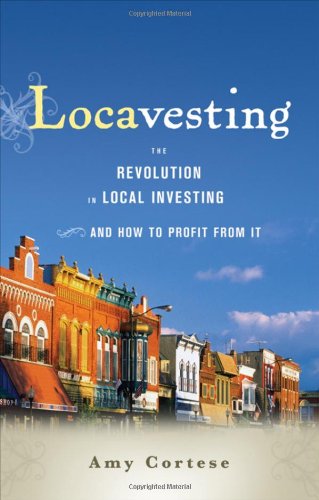Author Amy Cortese to Join Booksellers for Session on Alternative Financing
More and more small business owners are turning to their communities for financing options, and they’re often successful in finding community members with a desire to invest locally.
On Thursday, January 19, from 4:30 p.m. to 6:00 p.m., at Winter Institute 7, the panel “Is Alternative Financing an Option?” will examine alternative financing options available to booksellers. Featured speakers are Amy Cortese, author of Locavesting: The Revolution in Local Investing and How to Profit From It (Wiley); Rebecca Fitting, co-owner of Greenlight Bookstore in Brooklyn, New York; and Janet Geddis, owner of Avid Bookshop in Athens, Georgia.
 In Locavesting, Cortese discusses the choices that investors face and takes readers inside the local investing movement, where solutions to many of the country’s financial problems are taking shape. At Wi7, she aims to shed light on today’s financing options for indie booksellers.
In Locavesting, Cortese discusses the choices that investors face and takes readers inside the local investing movement, where solutions to many of the country’s financial problems are taking shape. At Wi7, she aims to shed light on today’s financing options for indie booksellers.
“There is a great desire on the part of many people to support and invest in the local companies that they know and love and want to see succeed, rather than simply putting their money into the faceless casino we call the stock market,” said Cortese. “It’s not always a simple matter, and business owners must tread carefully to stay within the bounds of securities laws. It can also be a scary leap for investors. But I hope booksellers will come away knowing that, while bank financing may be tight, there are alternatives. And moreover, that their customers and community can be their biggest supporters.”
Rebecca Fitting of Greenlight and Janet Geddis of Avid both employed alternative financing methods in opening their stores and agree that in doing so, they created a compelling story for their local communities to follow, and a business for them to eventually patronize.
“By announcing my plans well before I was in the position to sign a lease, I became a sort of underdog worth fighting for,” said Geddis, who, in 2008, began selling books through Biblio.com, and fund-raising through crowd sourcing site, IndieGoGo. Geddis opened her bricks-and-mortar store this fall, with enthusiastic community support. “Now there are people who come in every week who say, ‘I’ve been following you on Facebook for years!’ and ‘I’m so happy you did it!’ Turns out the Avid fan club was even bigger than I’d ever imagined.”
Rebecca Fitting and co-owner Jessica Stockton Bagnulo raised about $70,000 to open Greenlight Bookstore through community loans, and, as a result, customers feel rightfully invested in the store’s day-to-day operations.
“Partnering with our community really set our store’s personality on a distinct path that has enriched both our experience in founding the store, and also (we think!) the neighborhood’s relationship with the bookstore,” said Fitting. “This has been an invaluable, and unexpectedly important side-effect. When people band together to help create something, they really feel emotionally invested in it.”
Cortese points to recent nationwide shop local campaigns and the increased customer awareness that has created a distinct opportunity for small business owners.
“Let’s face it, the economy is still tough. But I think independent businesses are the beneficiaries of a new mood, or awareness, among the public,” she said. “People are becoming more aware of the costs of corporate capitalism — stagnant wages, outsourced jobs, income inequality, and a cookie cutter culture. At the same time, they understand that local businesses contribute to character of their neighborhoods and the strength of their local economies. Buy Local campaigns have been very effective, and the Occupy Wall Street movement continues to keep these issues at the forefront.
“Community financing may not be right for everyone, and even when it is, it may be just part of a broader financing strategy,” said Cortese. “But it builds loyalty and emotional connections that a bank loan never will!”
